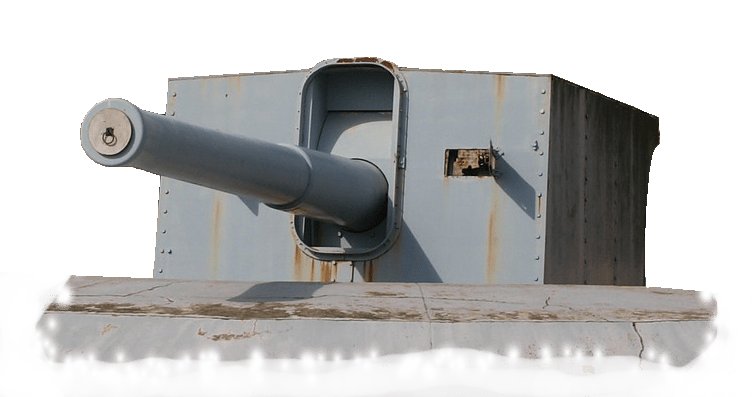
The 9.2 inch Gun was the premier coast defence gun in the 1880’s and remained so until Coast Defence disolved in 1956. There had been many variations of the gun, mostly in naval service but during WW2 only the Marks 9 & 10 were in use. The Mark 9 entered service in 1896 and was modernised in 1910 by fitting a single motion breech mechanism. This became the C Mark 9. The Mark 10 was introduced in 1899 with similar performance to the Mark 9 but had a slightly different breech mechanism with a Welin screw block. The Mark 10 had a slightly higher rate of fire.
The mountings were all the barbette type. The gun was emplaced in a pit with the barrel just clearing a parapet. A steel plate platform surrounded the gun forming a roof over the pit, which held the lower part of the mounting. Below this roof, ammunition was brought into the pit from underground magazines. By means of lifts and a trolley riding on a rail suspended from the roof, the round was delivered to a point below the breech. A lever opened a trapdoor in the roof and an hydraulic lift raised the shell to the breech. After the shell was rammed the same procedure was carried out to deliver the bag charge. The lift lowered and the trapdoor was closed before the gun fired.
Gun
| Mark 9 | Basic design, obsolete July 1941 |
| C Mark 9 | Converted to single motion breech mechanism |
| Mark 10 | Different breech mechanism to Mk 9 – Welin screw block |
| Mark 10V | Guns Nos. 240 & 241 designed by Vickers & differing in minor construction details |
| Mark 10* | The inner “A” tube tapered to ease withdrawl |
| Mark 15 | Approved April 1940. A Mk 10 with Asbury breech mechanism & built up gun |
Mounting
| Mark 5 | As described above. Elevation -10º to +15º, maximum range 21,000 yards |
| Mark 5A | Modified to take a C Mk 9 gun. Installed at Rock Bty, Gibraltar & New Needles Bty, Isle of Wight, probably nowhere else |
| Mark 5B | Similar to Mk 5A but changes in loading arrangements to suit improved projectiles introduced 1911-13 |
| Mark 5C | Installed on non-standard pedestal (No.4 instead of No.7). Only installed South Foreland Bty, Dover 1941 |
| Mark 6 | As for Mk 5 but max elevation 30º. Shields increased in height, of armour steel. Trolley moved to floor of the pit |
| Mark 6A | Conversion of Mk 5 to increase elevation to 30º, maximum range 29,500 yards. Hand traverse & ramming, power elevation |
| Mark 7 | Developed in the late 1920’s. As for Mk 5 but -5º to +35º elevation. Had rapid-loading gear, hydraulic wash-out & rammer, powered elevation & traverse. |
| Mark 8 | Vickers design for twin gun mount. Drawings produced in 1940 but no further action taken |
| Mark 9 | A 1939 simplified version of Mk 7. Rammer changed to rigid chain. Hoist now carried the shell & 2 portions of the charge. Doubtful many were built |
Data
9.2 inch Gun Mark 10 on Mounting Mark 7
| Weight of Gun & Breech Mechanism | 62,720 lbs |
| Total length | 442.35 inches |
| Length of Bore | 429.33 inches (46.7 calibres) |
| Rifling | 37 grooves, straight to 303.585 inches from muzzle then increasing to 1/30 at muzzle |
| Breech mechanism | Welin screw, single motion electric or percussion fired |
| Elevation | -5º to +35º |
| Traverse | 360º |
| Recoil system | Hydropneumatic , constant 40 inches |
| Weight in action | Approximately 125 tons |
| Rate of Fire | 2 – 3 rounds per minute |
Performance
Firing standard 380 lbs HE Shell
| Muzzle velocity | 2,700 feet per second |
| Maximum range | 36,700 yards |
Ammunition
| Shell, HE Mark 19B | Conventional nose-fuzed with Lyddite filling. Fitted with Percussion Fuze No. 45P |
| Shell, APC Mark 15B | Capped piercing shell with Percussion Base Fuze No. 346 |
| Shell, CPC Mark 9A | Capped piercing shell with Percussion Base Fuze No. 15 for ightly protected vessels |
| Shell, Shrapnel Mark 10 A | Filled with 2,500 lead/antimony balls & 2 lbs gunpowder expelling charge. Mostly used in practice & obsolete during the war |
| Propelling charge | Two half charge bags each of 53½ lbs of Cordite in a silk cloth bag with gunpowder igniter in the rear end. Two units made a full charge but ½ charges could be fired in practice shoots |
